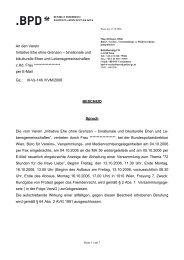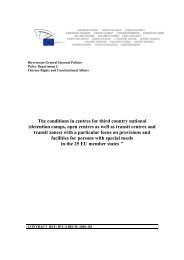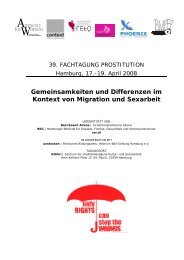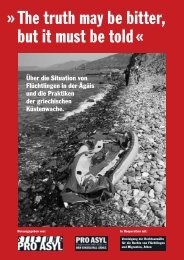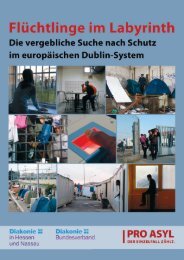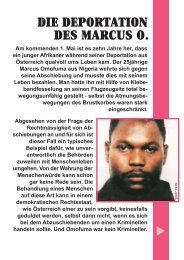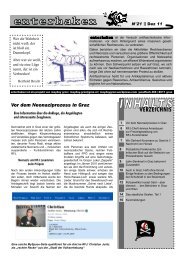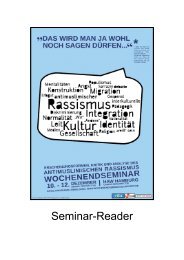Turin's CIE - International University College of Turin
Turin's CIE - International University College of Turin
Turin's CIE - International University College of Turin
You also want an ePaper? Increase the reach of your titles
YUMPU automatically turns print PDFs into web optimized ePapers that Google loves.
deportation order, information from the embassy, documents or any other reason. They do<br />
it more or less after six months” (Interview 7).<br />
There is strong evidence that Article 15(4) <strong>of</strong> EU Directive 2008/115/EC is being frequently<br />
ignored by Italian authorities, as exemplified in cases where irregular migrants are put inside<br />
<strong>CIE</strong> more than once even when it had not been possible to identify them during their first period<br />
<strong>of</strong> <strong>CIE</strong> detention:<br />
“There are migrants who have already been inside <strong>CIE</strong> three or four times and who have<br />
always been released because their embassy is not able to identify them” (Interview 28);<br />
“For example, I have a client who is currently detained in <strong>CIE</strong> and this is her third time<br />
inside <strong>CIE</strong>. But if you couldn’t repatriate her on either the first time or the second one, how<br />
can you put her inside <strong>CIE</strong> for a third time? Why do you detain her? It is only to increase<br />
the number <strong>of</strong> detainees because they [Questura] know that they will never be able to<br />
repatriate her. Serbia didn’t recognise her as a Serbian citizen, she has no birth certificate,<br />
she has no documents at all. They [Questura] continue asking the Serbian consulate for<br />
identification, even though I’ve already provided them with a declaration by the Serbian<br />
consulate where it is stated that she does not appear in their records. But they keep<br />
insisting” (Interview 8).<br />
A revealing element emerged from our detainee interviews: only one out <strong>of</strong> seventeen detainees<br />
replied affirmatively when asked whether he had ever met diplomatic or consular<br />
representatives from his country <strong>of</strong> origin during his period <strong>of</strong> detention inside <strong>CIE</strong>.<br />
Furthermore, our only interviewee to have met with consular <strong>of</strong>ficials, “X”, has a revealing story<br />
to tell. At the time we interviewed X he was inside <strong>CIE</strong> detention and he had been detained for<br />
approximately seven months. Moreover, before arriving in <strong>CIE</strong> X had also served a sentence <strong>of</strong><br />
thirteen months imprisonment and no identification procedure was started during that period.<br />
Three months after X entered <strong>CIE</strong>, the Moroccan consular representatives went to visit him. X<br />
told us they spoke about the place he comes from and about sending his documents from<br />
Morocco to Italy. Yet, strangely enough, it seems the Moroccan representatives did not talk to X<br />
about the authorisation for his repatriation at all. On the contrary: “they told me at the end <strong>of</strong> this<br />
month or next month maximum they [Italian authorities] would release me, but not sending me<br />
back to Morocco, just setting me free” (Interview 19). This is the only direct account we have <strong>of</strong> a<br />
meeting with consular representatives inside <strong>Turin</strong>’s <strong>CIE</strong>.<br />
The lack <strong>of</strong> cooperation between Italian and foreign authorities evidently affects detainees by<br />
increasing their feelings <strong>of</strong> uncertainty because they rarely know if and when their very own<br />
embassy or consulate will aid in the identification process. In addition, it generates a sense <strong>of</strong><br />
disappointment towards their own representatives who, from the detainees’ perspective, have<br />
simply left them inside the <strong>CIE</strong> without even trying to help them out. It seems that <strong>of</strong>ten, after a<br />
few months <strong>of</strong> detention, a number <strong>of</strong> detainees would simply like to go back to their home<br />
country. However, it appears that complex political issues are at stake and play a crucial role in<br />
the implementation <strong>of</strong> return decisions.<br />
74 | P a g e




